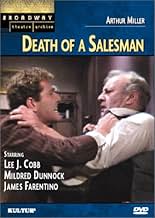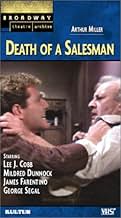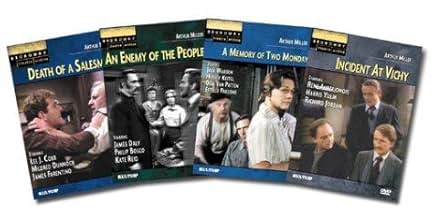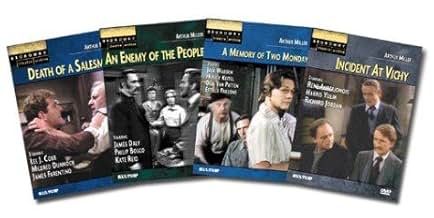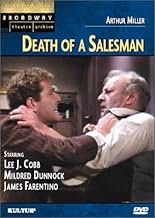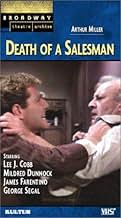AVALIAÇÃO DA IMDb
7,8/10
731
SUA AVALIAÇÃO
Adicionar um enredo no seu idiomaAn abridged award-winning television adaptation of a famous play about an aging travelling salesman who's on the verge of a nervous breakdown. His job is gone, and his family hates him for n... Ler tudoAn abridged award-winning television adaptation of a famous play about an aging travelling salesman who's on the verge of a nervous breakdown. His job is gone, and his family hates him for never being there. He tries mending things with them.An abridged award-winning television adaptation of a famous play about an aging travelling salesman who's on the verge of a nervous breakdown. His job is gone, and his family hates him for never being there. He tries mending things with them.
- Ganhou 3 Primetime Emmys
- 5 vitórias e 8 indicações no total
Marc Fiorini
- Stanley
- (não creditado)
Avaliações em destaque
Arthur Miller's play is an American classic, timeless and poignant. I've seen three film/TV and one stage version of the play. Lee J. Cobb's performance is the most powerful and frightening, comparable to his earlier performance in "12 Angry Men". As far as the character of Willy Loman and the sales profession a recommended viewing of "Glengarry Glen Ross" would be enlightening.
When "All My Sons" became too hard to take and critics began to call it a mere timepiece, Arthur Miller wrote another. Instead of life from the well-to-do point of view, he would wander to the other side of the street and look back. "Death of a Salesman" is life from the working man's front porch. And what a telling it is!
Finally, Lee J. Cobb and Mildred Dunnock have one more opportunity together, this time recorded for the ages. And the rest of the cast, superb.
Dear television gods, please bring it back at least one more time. This is a piece that needs to be seen by each generation: a constant reminder of how great the temptation always is to live in greed at the expense of the common man. Thank you again, Mr. Miller, for your wisdom and haunting words.
Finally, Lee J. Cobb and Mildred Dunnock have one more opportunity together, this time recorded for the ages. And the rest of the cast, superb.
Dear television gods, please bring it back at least one more time. This is a piece that needs to be seen by each generation: a constant reminder of how great the temptation always is to live in greed at the expense of the common man. Thank you again, Mr. Miller, for your wisdom and haunting words.
The only slight reservation I have about this TV version of the play is the fact that it was clearly shortened for the medium. The greatest thing about this recording is that it preserves Lee J. Cobb's interpretation of the lead role. I was enrolled in a drama school in the early 60s, a time when several of our teachers had actually seen him in the 1947 stage play. They would frequently speak, in reverent tones, of the scorching great performance that Cobb delivered. This 1966 television revival makes Cobb seem all the more remarkable to me due to the nearly twenty year interval that had passed since the New York run of the play. No matter how great a performance he might have initially delivered, many an actor would have lost a lot of the original intensity in that span. On top of this, Cobb had experienced a battering ordeal at the hands of the House on Un-American Activities Committee toward the end of the run of the play. There is a fascinating story behind Cobb's development of the role. During rehearsals, the director was considering replacing Lee, as his work was not showing promise. The story goes that, at a critical point, Cobb had been staring at a crack in a wall in the rehearsal space. Suddenly he was seized by a strong sense of the character which immediately endowed his reading with uncanny feeling and intensity. Late in the run, it is told that the characterization took such a pervasive hold on the actor that he started to take it home with him, unable to snap out of it.
Alex Segal and Lee J. Cobb leaves a piece of visual art for the ages with Segal's 1966 made for television version of Arthur Miller's play Death of a Salesman. Lee J. Cobb's exceptional turn as a salesman at the end of his rope, in more ways than one, is one that will stick with audiences long after the film's conclusion. Telling the all too relatable tale of the lack of control we all have over our lives is one which will strike a chord with audiences whether they are in the spring or autumn of their lives.
Willy Lowman (Lee J. Cobb) is a salesman relegated to the traveling circuit after a series of failures. In his 60's and tired Willy begins contemplating his life, both its successes and failures. He begins to get hung up on his failures and loses control of his life. When Willy's sons come home, be spirals even further into his failures as a father. Willy is constantly criticizing his son Biff (George Segal) claiming that he has yet to make anything of his life. His demure and obedient wife Linda (Mildred Dunnock) is constantly trying to both soothe Willy's doubts and support her sons. Ever nearing a nervous breakdown, Willy begins to relive each of his many personal failures, from the affair he committed against his wife, to the failed business decisions he made with his brother. The family is reeling from Willy's current business failures becoming behind on the final mortgage payment on their home. Dripping further and further into self-loathing, the Lowman family seeps to the pit of despair each wallowing in their various missteps in life.
Life is full of transition phases, and each member of the Lowman family was experiencing their own unique life transitions. The boys were transitioning into adulthood which oftentimes requires one to abandon the way you thought adulthood would be and embrace what it is. Willy is transitioning in his career, not being as needed in his sales industry like he once was. Linda is transitioning into the autumn of her life, as she has stopped coloring her gray hair and seems to be accepting her decline in years. Oftentimes as we transition in our stages of life, we attempt to assemble a sense of control over things that we truly have no control over. One cannot stop the hands of time, and with each passing year comes a new reality of life. The more we try to control our lives, like Willy did, the more we realize we have no control. Another unfortunate truth we learn with each successive stage in life is just how little freedom we have. For most of our lives, human beings are chained to jobs out of necessity to make money to survive. We spend our lives away at jobs just so we can pay to have somewhere to live, even though we never get to spend any time there because we are always working. Willy worked his whole life only to die before the final payment on his house was made. Willy's is the story of so many everymen, living life for someone else only to be supremely disappointed by its outcomes because we never get to live our lives for ourselves.
I watched this version of Death of a Salesman for Gene Wilder, although Lee J. Cobb is always a treat. It is disappointing to watch the earlier films in a favorite actor's filmography, as they are often only relegated to a handful of scenes. The few scenes Wilder was in were wonderful, and his gentle presence commanded the screen. He enjoys a powerful scene with Cobb in which he calls him to question what happened at what turned out to be a fateful meeting between him and his son. In spite of his minimal screen time, Gene Wilder was fantastic in the role of Bernard, Biff's tutor. I came for Gene Wilder, and stayed for Lee J. Cobb, and one can't really be disappointed about that.
Willy Lowman (Lee J. Cobb) is a salesman relegated to the traveling circuit after a series of failures. In his 60's and tired Willy begins contemplating his life, both its successes and failures. He begins to get hung up on his failures and loses control of his life. When Willy's sons come home, be spirals even further into his failures as a father. Willy is constantly criticizing his son Biff (George Segal) claiming that he has yet to make anything of his life. His demure and obedient wife Linda (Mildred Dunnock) is constantly trying to both soothe Willy's doubts and support her sons. Ever nearing a nervous breakdown, Willy begins to relive each of his many personal failures, from the affair he committed against his wife, to the failed business decisions he made with his brother. The family is reeling from Willy's current business failures becoming behind on the final mortgage payment on their home. Dripping further and further into self-loathing, the Lowman family seeps to the pit of despair each wallowing in their various missteps in life.
Life is full of transition phases, and each member of the Lowman family was experiencing their own unique life transitions. The boys were transitioning into adulthood which oftentimes requires one to abandon the way you thought adulthood would be and embrace what it is. Willy is transitioning in his career, not being as needed in his sales industry like he once was. Linda is transitioning into the autumn of her life, as she has stopped coloring her gray hair and seems to be accepting her decline in years. Oftentimes as we transition in our stages of life, we attempt to assemble a sense of control over things that we truly have no control over. One cannot stop the hands of time, and with each passing year comes a new reality of life. The more we try to control our lives, like Willy did, the more we realize we have no control. Another unfortunate truth we learn with each successive stage in life is just how little freedom we have. For most of our lives, human beings are chained to jobs out of necessity to make money to survive. We spend our lives away at jobs just so we can pay to have somewhere to live, even though we never get to spend any time there because we are always working. Willy worked his whole life only to die before the final payment on his house was made. Willy's is the story of so many everymen, living life for someone else only to be supremely disappointed by its outcomes because we never get to live our lives for ourselves.
I watched this version of Death of a Salesman for Gene Wilder, although Lee J. Cobb is always a treat. It is disappointing to watch the earlier films in a favorite actor's filmography, as they are often only relegated to a handful of scenes. The few scenes Wilder was in were wonderful, and his gentle presence commanded the screen. He enjoys a powerful scene with Cobb in which he calls him to question what happened at what turned out to be a fateful meeting between him and his son. In spite of his minimal screen time, Gene Wilder was fantastic in the role of Bernard, Biff's tutor. I came for Gene Wilder, and stayed for Lee J. Cobb, and one can't really be disappointed about that.
Willy Loman never realises until the end that he is a loser. Although his son Biff knows he himself is a loser, his father won't accept this. Son, Hap, like his father doesn't know he is a loser, either. Miller seems obliquely to imply that society is to blame for Willy's sad life. Maybe so, surely society doesn't cut him much slack, especially as represented by the son of his long time firm, for which he has been a fairly successful salesman much of his life. Whatever one's opinion on this subject, the play certainly portrays very genuine emotions and problems as the aging Willy more and more loses contact with reality and harkens back to nodal points in his life, especially contacts with his successful brother Ben. Or is Ben just a figment of his imagination. We can only guess. At the final funeral scene, Hap's losing philosophy continues. Could he and Biff take Willy's $20,000 insurance award and make it as ranching partners out west? We'll never know; Hap is determined to "make it big" in the Big Apple. Fat chance!
A better cast would be hard to imagine and the stage setting is beautifully photographed. The "fantasy" scenes are smoothly integrated with bits of "movie magic" that emulate what would be accomplished in the theatre with tricks of lighting. Cuts from the complete play are minor. This was TV at its best.
A better cast would be hard to imagine and the stage setting is beautifully photographed. The "fantasy" scenes are smoothly integrated with bits of "movie magic" that emulate what would be accomplished in the theatre with tricks of lighting. Cuts from the complete play are minor. This was TV at its best.
Você sabia?
- CuriosidadesIn his autobiography "Timebends", Arthur Miller said that Lee J. Cobb was his favorite Willy Loman.
- ConexõesFeatured in Role Model: Gene Wilder (2008)
Principais escolhas
Faça login para avaliar e ver a lista de recomendações personalizadas
Detalhes
- Data de lançamento
- País de origem
- Central de atendimento oficial
- Idioma
- Também conhecido como
- La muerte de un viajante
- Locações de filme
- Empresa de produção
- Consulte mais créditos da empresa na IMDbPro
Contribua para esta página
Sugerir uma alteração ou adicionar conteúdo ausente

Principal brecha
By what name was Death of a Salesman (1966) officially released in Canada in English?
Responda

